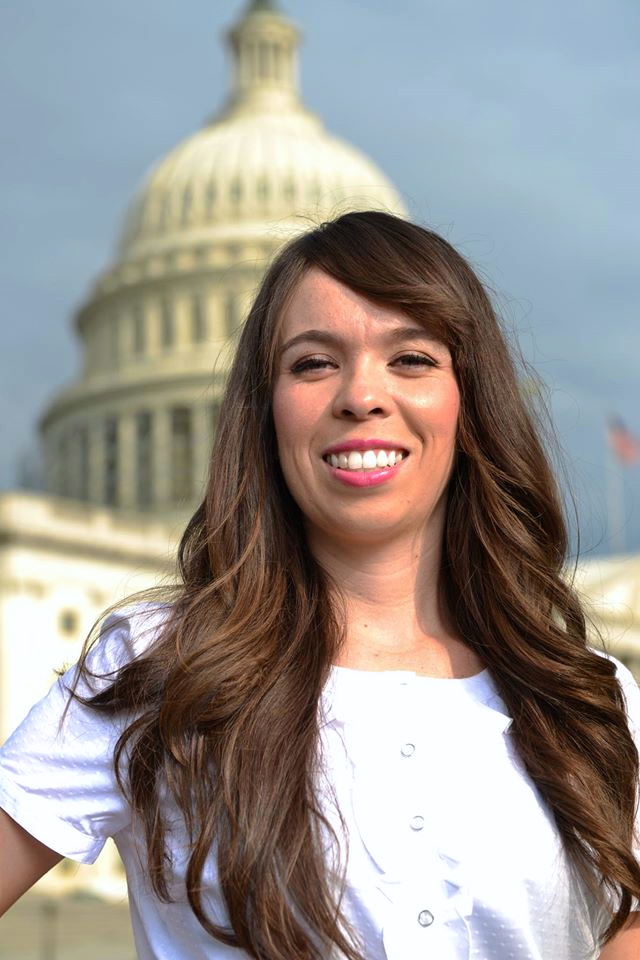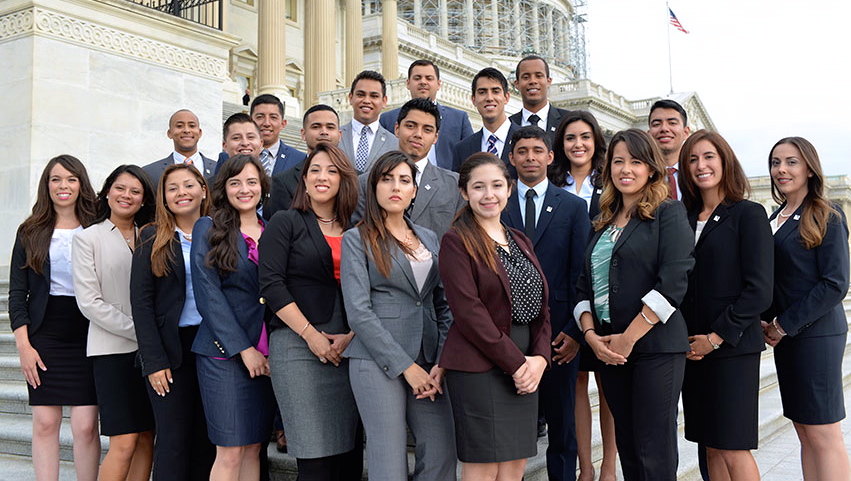
The selection process is competitive; CHCI receives five applications for every one available fellowship. We interviewed current fellow Tracie Sánchez to learn more about this unique opportunity. As this year’s CHCI Higher Education Graduate Fellow, Tracie had the opportunity to work for The White House Initiative for Education Excellence for Hispanics, as well as the U.S. House Committee on Education and Workforce (Democrats), where she worked on the committee’s Higher Education portfolio.
1. What inspired you to apply for the CHCI Higher Education Graduate Fellowship?
Coming out of my master’s program I felt frustrated about the research-to-practice gap. At the same time, I was eager to continue to explore and learn how I could apply my education research background to creating change for historically underrepresented students in higher education. Applying to the CHCI Higher Education Graduate Fellowship was my way of stepping away from the theory and moving towards the implementation. Through the fellowship, I was given a bird’s eye view of higher education policy and a crash course on how the availability or lack of research shapes federal policy implementation. Additionally, during meetings with stakeholders from higher education, K-12 school districts, and community and advocacy-based organizations, I gained invaluable exposure to local, state and federal efforts made to address access and retention for low-income, first-generation, historically underrepresented students.
2. What are some of the benefits of the fellowship?
After a week-long orientation, graduate fellows begin gaining work experience in their respective placements, which include congressional offices or committees, The White House, federal agencies and nonprofit organizations. Graduate fellows’ intensive work experience is enhanced by weekly leadership training sessions that allow them to meet with national leaders and engage in substantive policy discussions. This year, fellows had the opportunity to meet with a number of prominent leaders, including Secretary of Education Arne Duncan, Congresswomen Linda Sánchez, Congressman Ruben Hinojosa, U.S Department of Housing and Urban Development Assistant Secretary for Public Affairs Betsaida Alcantara, National Urban League President Marc Morial,Excelencia in Education’s Chief Operating Officer and Vice President for Policy Deborah A. Santiago, and President of the Center for American Progress Neera Tanden, among many others.
In addition to intensive weekly professional development opportunities, Graduate Fellows produce a policy brief on a topic of their choosing and present it during CHCI’s Annual Capitol Hill Briefing Series. Policy briefs are an opportunity for Graduate Fellows to continue producing research in their specific areas of expertise and to submit their work for publication in the Harvard Journal of Hispanic Policy. My policy brief was titled “Reaching for 2020: The Role of Latina/o Community College Success in National College Completion Goals.” It addressed how federal policy can facilitate Latino community college success.
As part of CHCI, fellows receive financial benefits, including a payment of $2,900 minus required federal and state deductions upon arrival to Washington, DC. Throughout the remaining nine months of the fellowship, Graduate Fellows receive a bi-weekly stipend of $1,160. Also, Graduate Fellows receive a professional development fund, metro benefits, and domestic round-trip transportation to Washington, D.C.
Lastly, there are numerous opportunities to engage in CHCI’s Alumni Association’s vast network of Latino leaders across sectors and industries. The CHCI Alumni Association currently has 8 chapters which support 3,100 alumni nationwide.
3. What tips would you give to aspiring applicants?
When I applied to the CHCI Graduate Fellowship, I had very little exposure to the work of the organization and had no mentorship throughout the application. For this reason, my recommendation for aspiring applicants is learn everything you can about CHCI as an organization, including the events they put on, the alumni network, their mission, their sponsors and their long-term goals as an organization. Additionally, I would highly encourage applicants to connect with former CHCI fellows to obtain an insider’s perspective of their experience and how the fellowship enhanced their professional career. Also, I would encourage folks to review the policy briefs produced by former fellows to ensure that you are not proposing to replicate the same policy brief. Proposing a unique and timely issue as the theme of your policy brief will enhance your application. Lastly, I would highly encourage applicants to be thoughtful in the written portion of the application and be well prepared for the phone interview. In conjunction with your resume and other supporting documents, your personal statement and phone interview are opportunities for you to market yourself as a candidate who brings to the table skills and experiences previous fellows have not had.
Tracie Sánchez was born and raised in East Los Angeles, a predominantly working class Mexican community. Tracie graduated with her M.A. from the graduate department of Education and Information Studies at UCLA, with a Higher Education and Organizational Change degree. Tracie deferred acceptance to UCLA’s Higher Education Ph.D. program in light of her acceptance to the CHCI Graduate Fellowship. Tracie looks forward to returning to Southern California upon completion of the CHCI Higher Education Fellowship. She will pursue a doctorate degree in Higher Education and continue to serve as mentor for first-generation Latina/o students attending community colleges.
© Victoria Johnson 2015, all rights reserved.
